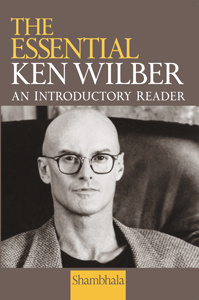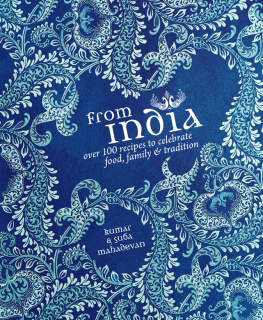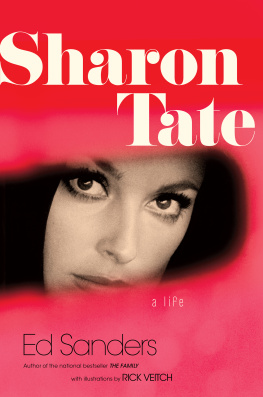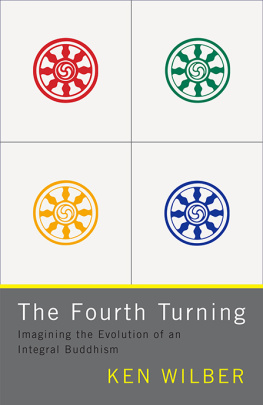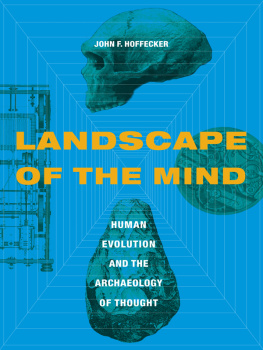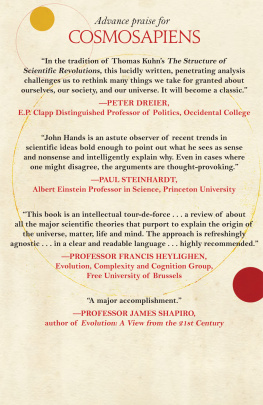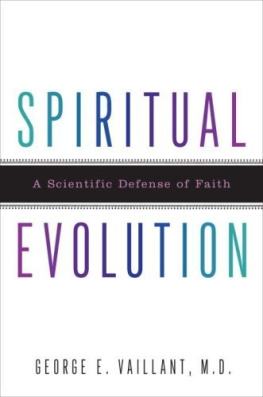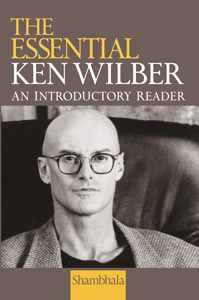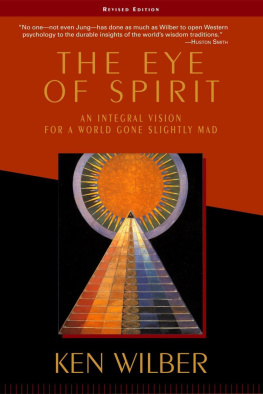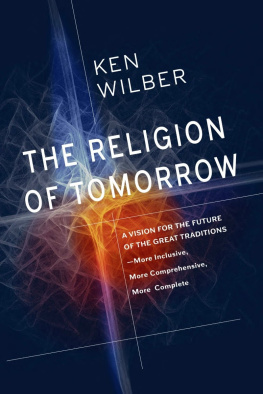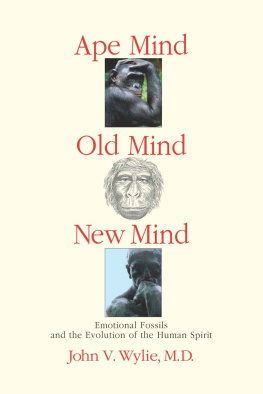A timely and bold wake-up call for humanity.
San Francisco Chronicle
Hugely informed, outspoken, and deeply illumined, Ken Wilbers penetrating insights uplevel the whole game of understanding human beings and human history.
Branches of Light
The scope of the work is extraordinary. Only a handful of thinkers, such as Aurobindo in the East and Hegel in the West, have assembled such vast evolutionary visions. Yet Wilbers view is unique not only in providing a far-reaching vision but also in grounding that vision in contemporary research in fields such as cosmology, biology, anthropology, sociology, psychology, and ecology.
Roger Walsh, Resurgence
Wilber possesses the rare combination of a deep, advanced spiritual practice with a sharp wit, brain power and scholarship to rival the finest Princeton Ph.D.... Sex, Ecology, Spirituality rewards the reader with a comprehensive, nondualistic, and sophisticated analysis of our world and consciousness.
Green Living
Wilbers book is essential reading as a transplanetary survey of our problems and our possibilities. This is a book to live with for the next five years, and carry with you long into the next century.
David Boadella, Journal of Family Life
Wilber is without a doubt one of the most significant thinkers of our time and brings a fresh understanding to our cultural situation and the prospects for an integral worldview in the next century. He displays a staggering erudition... a profound intuitive understanding and a highly developed analytical capacity. The combination is breathtaking.... Any thinker concerned with the big picture will find Wilbers work a gold-mine of insights which make compulsory reading for the 21st century.
Network: The Scientific and Medical Network Review
Exhaustive exploration of the history of consciousness.
Parabola
I think the most significant recent development in the field [of Transpersonal Psychology] is the publication of Ken Wilbers book, Sex, Ecology, Spirituality. I would encourage anyone interested in exploring the field in depth to read this volume.
Gnosis Magazine
The twenty-first century literally has three choices: Aristotle, Nietzsche, or Ken Wilber. This book, written with remarkable scholarly breadth and depth, is exactly the medicine we need for the new century and the new millennium: not because it will make us feel good, which it surely might, but because it can jolt us awake.
Jack Crittenden, Ph.D., author of Beyond Individualism
ABOUT THE BOOK
In this tour de force of scholarship and vision, Ken Wilber traces the course of evolution from matter to life to mind and describes the common patterns that evolution takes in all three of these domains. From the emergence of mind, he traces the evolution of human consciousness through its major stages of growth and development. He particularly focuses on modernity and postmodernity: what they mean; how they impact gender issues, psychotherapy, ecological concerns, and various liberation movements; and how the modern and postmodern world conceive of Spirit. This second edition features forty pages of new material, new diagrams, and extensively revised notes.
KEN WILBER is the author of over twenty books. He is the founder of Integral Institute, a think-tank for studying integral theory and practice, with outreach through local and online communities such as Integral Education Network, Integral Training, and Integral Spiritual Center.
Sign up to learn more about our books and receive special offers from Shambhala Publications.

Or visit us online to sign up at shambhala.com/eshambhala.
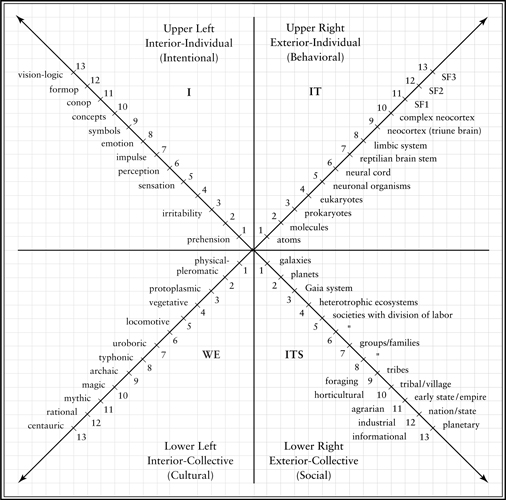
Sex, Ecology, Spirituality

The Spirit of Evolution
SECOND EDITION, REVISED
Ken Wilber

SHAMBHALA
Boston & London
2011
SHAMBHALA PUBLICATIONS, INC.
Horticultural Hall
300 Massachusetts Avenue
Boston, Massachusetts 02115
www.shambhala.com
1995, 2000 by Ken Wilber
Cover art: Group ix, series uw The Dove, nr 2 (Lnr 174) by Hilma af Klint. Courtesy of the Hilma af Klint Foundation, Stockholm, Sweden
All rights reserved. No part of this book may be reproduced in any form or by any means, electronic or mechanical, including photocopying, recording, or by any information storage and retrieval system, without permission in writing from the publisher.
Library of Congress Cataloging-in-Publication Data
Wilber, Ken.
Sex, ecology, spirituality: the spirit of evolution / Ken Wilber.2nd ed.
p. cm.
Includes bibliographical references and index.
eISBN 978-0-8348-2108-8
ISBN 1-57062-744-4 (alk. paper)
1. Cosmology. 2. Consciousness. 3. EvolutionPhilosophy. 4. Whole and parts (Philosophy) 5. God. I. Title.
BD511.W54 2000
110dc21
00-044003
THE GENESIS OF SEX, ECOLOGY, SPIRITUALITY
S EX, ECOLOGY, SPIRITUALITY was the first theoretical book I had written in almost ten years, following the events described in Grace and Grit. The previous book, Transformations of Consciousness (with Jack Engler and Daniel P. Brown), was completed in 1984; I wrote Grace and Grit in 1991; and then I settled down to finally write a textbook of psychology that I had been planning on doing for several years. I was calling that textbook System, Self, and Structure, but somehow it never seemed to get written. Determined to complete it, I sat down and began transcribing the two-volume work, whereupon I realized, with a shock, that four of the words I used in the very first paragraph were no longer allowed in academic discourse (development, hierarchy, transcendental, universal). This, needless to say, put a considerable cramp in my attempt to write this book, and poor System, Self, and Structure was, yet again, shelved. (I recently brought out an abridged version of it with the title Integral Psychology.)
What had happened in my ten-year writing hiatus, and to which I had paid insufficient attention, is that extreme postmodernism had rather completely invaded academia in general and cultural studies in particulareven the alternative colleges and institutes were speaking postmodernese with an authoritarian thunder. The politically correct were policing the types of serious discourse that could, and could not, be uttered in academe. Pluralistic relativism was the only acceptable worldview. It claimed that all truth is culturally situated (except its own truth, which is true for all cultures); it claimed there are no transcendental truths (except its own pronouncements, which transcend specific contexts); it claimed that all hierarchies or value rankings are oppressive and marginalizing (except its own value ranking, which is superior to the alternatives); it claimed that there are no universal truths (except its own pluralism, which is universally true for all peoples).
The downsides of extreme postmodernism and pluralistic relativism are now well known and widely acknowledged, but at the time I was trying to write System, Self, and Structure, they were thought to be gospel and were as religiously embraced, making any sort of developmental and transcendental studies anathema. I therefore set
Next page
